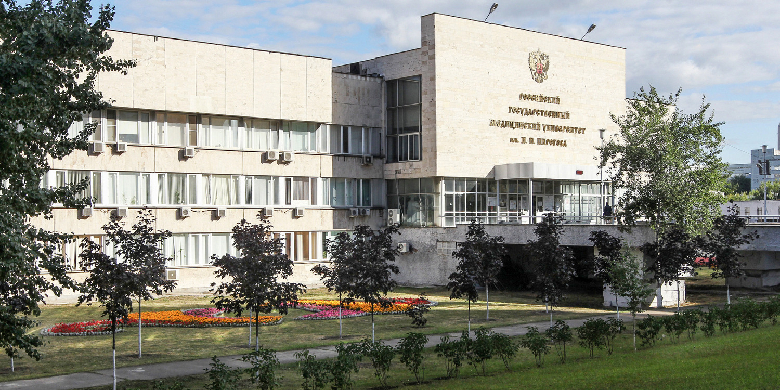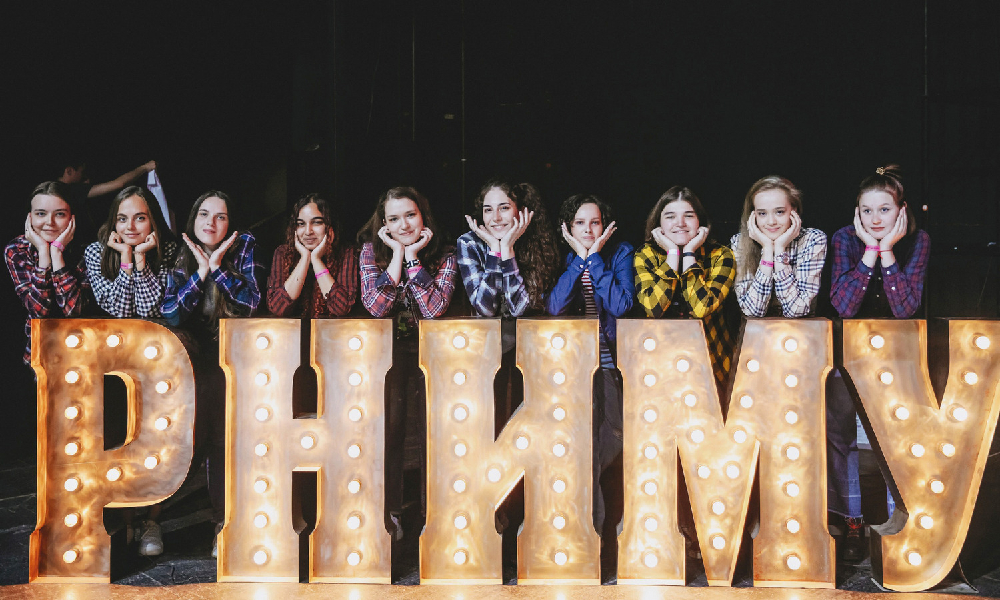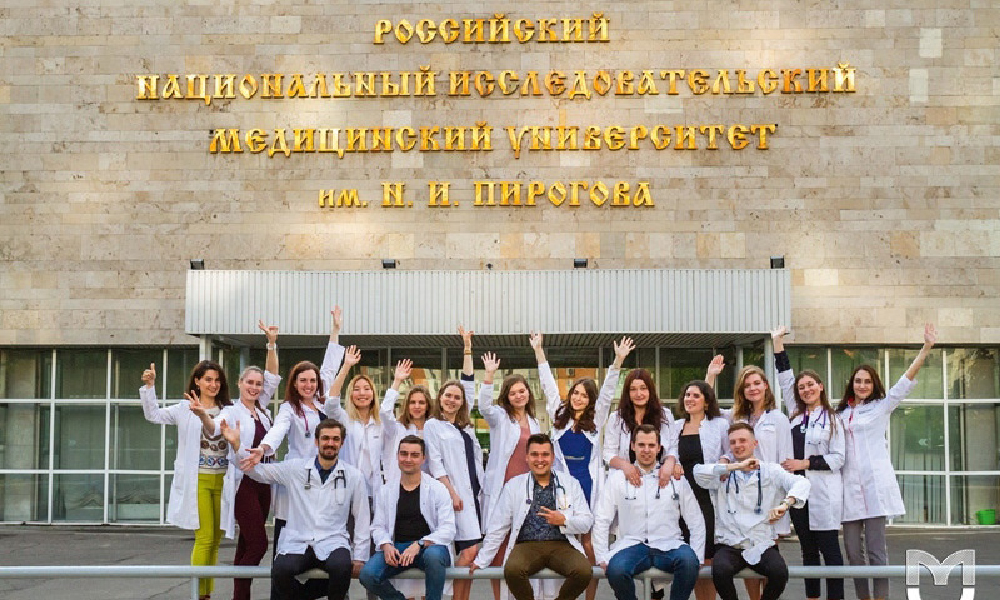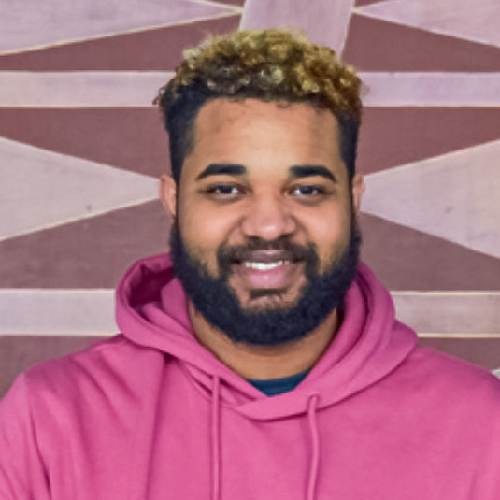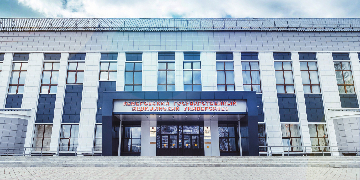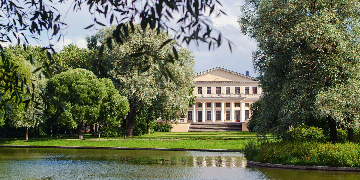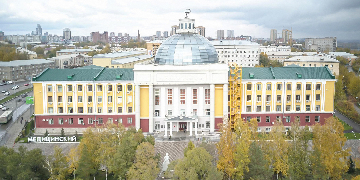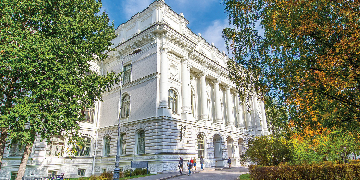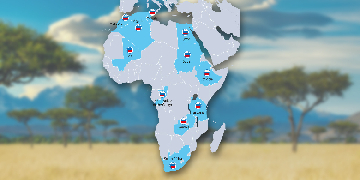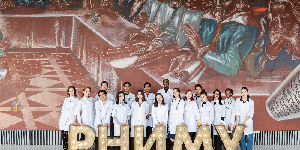17
Bachelor's, Specialist's, Master's programs
2,700
residents and PhD students
10,000
students pursuing Bachelor’s, Specialist’s and Master’s degrees
1,400
international students
11,500
students pursuing advanced training programs
13,000
school students participating in pre-university training programs
Pirogov RNRMU is a leading medical university in the Russian Federation that trains physicians, pharmacists, clinical psychologists, social workers, and research staff.
Training is provided at the university clinics established at the leading medical centers in Moscow and at the clinical departments that are a part of the university.
RNRMU is the only Russian medical university that was assigned a category of National Research University.
rsmu.ru
VK – @rnimupirogov
Telegram – @daily_2med
Youtube – @РНИМУимениНИПирогова
Tuition fees per year
Bachelor's and Specialist's programs 315,000 – 500,000 RUB
Master's programs 250,000 – 370,000 RUB
Residency programs 520,000 – 600,000 RUB
PhD programs 410,000 – 450,000 RUB
Applicant guide
Places allocated for the 2024-2025 academic year
- 75 fee-paying places
- 75 state-funded places
The number of state-funded places allocated by the Ministry of Science and Higher Education of the Russian Federation
Bachelor’s programs – 6 places
Master’s programs – 2 places
Specialist’s programs – 148 places
PhD programs – 10 places
Residency programs – 34 places
Continuing professional education program – 50 places
Educational programs
Specialist’s and Bachelor’s programs
- General Medicine (General Medicine major) RU, EN
- General Medicine (Fundamental Medicine major)
- Pediatrics
- Dentistry RU, EN
- Medical Biochemistry
- Medical Biophysics
- Medical Cybernetics
- Pharmacy
- Clinical Psychology
- Employment Psychology
- Social Work
- Biology
Exams
Foreign citizens can apply to the university based on the results of the Unified State Exams, as well as the results of entrance exams held by the university.
All tests (except for entrance tests in a foreign language and tests for those applying for English-taught programs) are conducted in Russian.
Entrance exams
Bachelor’s/Specialist’s/ Master’s programs
- computer-based testing (offline or online)
PhD programs
Residency programs
- computer-based testing (offline)
Documents required for admission
- Application
- Passport or any other document confirming identity
- Visa (for citizens of countries that maintain a visa regime of entry and stay in the territory of the Russian Federation), migration card, registration if the applicant stays in the Russian Federation. They should wait for an invitation for visa application – Online form of the “Invitation for Visa Application” request– for at least one month
- Certificate of foreign education recognition in the territory of the Russian Federation if such a certificate is required when submitting the document issued in a foreign state
- Referral from the Ministry of Science and Higher Education to study within the quota established by the Russian Federation Government (if any)
- Copy of medical certificate confirming the absence of medical contraindications to studying, Fluorography picture, HIV, HBs, HCV tests, with the translation, if necessary
- Voluntary health insurance policy which is valid in the territory of the Russian Federation
Invitation for Visa Application
Recognition of foreign education
Main State Center for Education Evaluation
Preparatory department
Every year the preparatory courses of our university bring together attendees from more than 30 countries.
They study the Russian language, physics, chemistry, and biology.
Tuition fee
160,000 RUB crash course, 4 months
320,000 RUB complete course, 10 months
Vice-Rector for International Affairs, Dean of the International School of Medicine
Nadezhda Bylova
+7 495 434-22-66, ext. 23-60
+7 903 763-13-97
ims@rsmu.ru
bylova_na@rsmu.ru
Department of Admission to Higher Professional Education Programs
Head of the Department
Elizaveta Korotkaya
+7 495 434-31-74
prk@rsmu.ru
Quarshie Ser Richiz, Ghana
Our teachers listen to us attentively, when we tell them about our problems, and are willing to help us at once, and, if we don’t understand something, they try to explain it. Students know the learning process structure beforehand. My favorite subjects are anatomy, physiology, and pharmacology.
The most difficult thing about learning Russian is some medical terms as well as patients’ complaints. The symptoms can be very specific. In such cases, I search for the information on the Internet.
Here I have friends from different countries, including Russia.
Discounts and awards
- F. Gaaz award for foreign citizens pursuing Bachelor’s and Specialist’s programs – starting from the fourth year of study
- A personal award in the amount covering the yearly tuition fee: a 100% discount
- Senior students (from the fourth-year) having a 5.0 grade point average in their record book can be eligible for a discount
- 10% if the exams are passed with flying colors
Arrival and adaptation
Moscow is the largest transport interchange hub of Russia. Foreign citizens usually come by plane. You can get from the airport to the university by bus, commuter train, metro, or taxi.
The taxi fare is 1,500–2,000 RUB
Average monthly expenses
- Accommodation costs 25,000–30,000 RUB
- Travel using a student's social card costs 850 RUB
- The dormitory fee is around 2,150 RUB
Accommodation
International students live together in one building of the comfortable dormitory. The dormitory has everything you need, including an ensuite bathroom, a kitchen, and self-study rooms. In winter, the rooms are heated.
The dormitory is located within walking distance of the main university building and the nearest metro station.
Climate
The climate in Moscow is mid-continent.
Summer. Summer is warm and rainy.
+22-24°С in the daytime +12-14°С at night
Winter. In winter, Moscow has a rather high snow cover.
-5°С in the daytime -10°С at night
However, extreme warm and cold spells also occur.
25.10.2023
